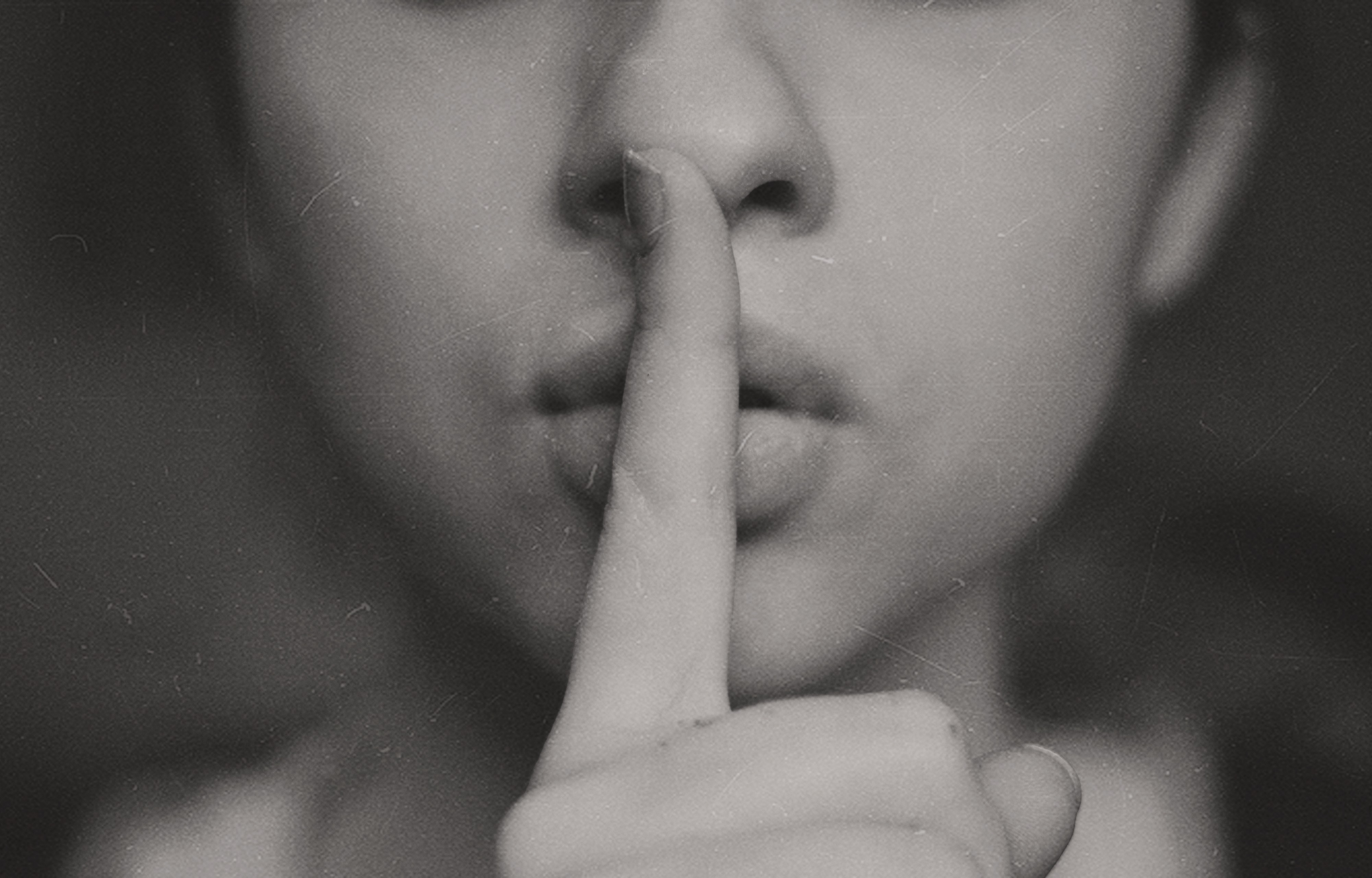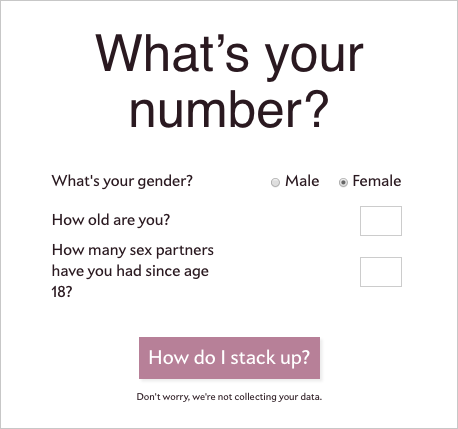And what the number of sexual partners says about you
 Image licensed from Canva
Image licensed from Canva
It was very early on into our relationship, we have just started dating when the question came up. No one has ever asked that before and looking back on it, I have to admit, that my naivete was sky-high. I answered honestly ? because I usually do, and because I didn?t know better and I didn?t even know I should have known better. He let out a small, incredulous laugh, he caressed my face and told me that it?s nothing, it?s really nothing.
How many partners did you have before me?
Such an innocent question, right? I wasn?t proud of or ashamed about it. I never cared, and I didn?t think it was a big deal, I didn?t even care to ask back.
Then when the abuse started, slowly and subtly at first, my seemingly ?nothing? answer became a source of terror. The number I told him became a curse word, and he was torturing me with it at each and every abuse cycle. He was coming back to it, always, every time, without exception. It was the reason for me being called a slut, a whore or damaged good ? sometimes all three of it, and then some.
One desperate time, with tears in my eyes, I asked him what would have been the right answer for him not to torture me. He said it should have been maximum 2, but he would have preferred really zero. I was 35 years old ? and my number was above his limit of 0 or 2.
He was obsessing about it, he sent me tons of articles ? one day proving that everybody says on the internet that I am a slut with this number, the other day proving that my number is way below the average. The beautiful and terrifying thing about the internet is that you will find proof for everything, and for the opposite of it too.
How many sexual partners is too much to have?
It has been a widely discussed and debated topic, and there are millions of answers and opinions out there ? trying to fuel someone?s obsession, by angering them or calming them.
An average is just a number
There are studies on the average number of partners, by year, by generation, by location, by sex, by sexual orientation. It is great! It is great to have this information available; it tells us a great deal about society and trends. Sociology is thriving on statistics, I should know, I have a degree of it. For example, I personally find it fascinating that the average number of sex partners worldwide has been decreasing by the generation ? Baby Boomers leading, then GenX already below them and Millennials even below GenX. It is interesting to try to decipher the possible reasons, the attitudes ? it tells us a lot about changes and shifts in society.
What it doesn?t tell us is anything on the level of individuals. And that?s right this way, as statistics by nature are bound to look at the bigger picture, clustering, summarising, stereotyping ? degrading the individuals to data items, for the sake of understanding the underlying tendencies.
But the number of sexual partners is a personal choice ? not a societal one.
To be fair, it is true, how many people a person has slept with or how regularly they enjoy casual sex can tell you a lot about them. A person?s number can suggest a whole lot of things, whether you deem it wrong or right:
- their level of sexual experience,
- hints about their personality ? more sexually adventurous people naturally tend to be more extroverted,
- speaks about how social they are ? having more friends and connections in general,
- it can be an indication of their interest in alcohol or other substances ? as in consuming more of them,
- and it can suggest their views and values related to sex ? they tend to be more sex-positive and liberal.
What a number won?t tell you is the quality of someone?s character. No sexual history ? especially not one described by a 1?2?3 digit number ? can tell you anything about the person itself. It doesn?t suggest whether they are intelligent, loyal, ethical, kind, empathetic, caring or the exact opposite.
Yet research suggests that despite the fact that the numbers are not too tell-tale on an individual level, people still care about it, and tend to jump into biased and judgmental mode ? if it?s too high or too low. Yes, neither is good. Damned if you do and damned if you don?t.
Although it might seem like society has come a long way in destigmatizing sexuality, taking such a simple indicator can reveal how many grey areas are out there in terms of definition, expectation and it speaks volumes about gender and sexual orientation biases.
There is no agreement in the ideal number
It starts with the definition of sex, that is interpreted differently by different individuals. For example, many men don?t count oral sex as sex, but for women, oral sex is a central act in their sexual playbook.
The ideal number varies by the report, depending on when the study was done, what panel was asked, and even how the question was formed. Think about different phrasing of the same question, when the question itself already suggests a direction ? what is ideal versus what is acceptable versus what is too many.
One report says the ideal number of sexual partners for maximizing happiness is one a year. The other found three partners to be the ideal. Men in their 20s consider seven or more partners ?too high? for a woman; women in the same age group are more lenient, considering ten or more partners to have too high. According to another one men set the limit at 14 sexual partners maximum, while women drew the line at 15. Moreover, men saw less than three partners as too low. For women, less than two was too low.
People still lie about it
 Photo by Kristina Flour on Unsplash
Photo by Kristina Flour on Unsplash
Note, that all of these numbers are self-reported. People lie. People forget. People reframe. Of course, as they are self-reported, we will have no proof of people lying, but round numbers are suspiciously popular. Not a lot of people report having slept with nine or twenty-one people. Stating to have slept with ten or twenty is much more common. Women tend to under-report their numbers and men tend to over-report.
This suggests that, on some level, men and women still associate a higher number of sexual partners with promiscuity in women and sexual prowess in men.
 Care to find out where you stand?
Care to find out where you stand?
People feel awkward talking about it
Do we even need to talk about it? Does it really matter? And if it does, when should this conversation take place?
The majority of people still believe that it is important to share relevant sexual history details ? numbers included. Especially because if it is a deal-breaker, then it has to be known sooner or later. They find that the best time to discuss is somewhere already during the first month ? decreasing the risk of possible misalignments later on.
Women are judged more than men
As said above, we are getting better at destigmatizing sexuality, but the harsh reality is that the classic double standards still linger: While men are praised for having sex with a lot of people, women are shamed for it. That?s wrong on so many levels, but in principle, it means that no matter how far we have come, we still have an even longer way to go before an attitude of sexual acceptance and celebration truly becomes the norm.
Promiscuous women considered being less confident than women who?ve slept with fewer partners. And it is women who will judge women with more partners as less competent, emotionally stable, warm, and dominant. And equally for both genders those with higher numbers are viewed as less intelligent, kind, honest or trustworthy.
Both men and women expressed equal reluctance to get involved with someone who they judged as having an extensive sexual past. There is a decrease in willingness to date someone as their numbers are getting higher as reportedly they tend to view these people as poor choices for long-term partners, friends, although occasionally acceptable for a casual, short-term fling.
Final words
Society and culture have still a long way to go before we the attitudes toward sexuality will get to a level where acceptance and sex-positivity is the norm.
The gender bias is more prominent than it should be, women are still shamed to an unacceptable extent for choosing casual sex or even serial monogamy.
While the number in itself doesn?t suggest anything about the quality of someone?s personality, the possible misalignments should be treated early on.
I am always advocating for open communication within a relationship, but here I would add one last thought, mainly based on my personal negative experience: If you, for some reason, find it way too important to know about the exact figures of your partner?s sexual history, maybe it is time to stop and ask yourself what lies behind it. What emotions drive your curiosity? Insecurity? Shame? Jealousy? Is it the societal norms that drive you to care this much? Take some time to think this over, discuss it with your partner if you feel comfortable enough. After all your partner?s sexual past doesn?t have much to do with how they?ll treat you in the present or in the future.
As long as your partner is happy and satisfied with their sexual experiences ? whether they happen quite frequently or they?re few and far between ? then they?re already at their own ideal.
And this should be good enough for you too. I hope it is.
If you liked this and want some more, let?s keep in touch. Find me on Twitter or IG and sign up for my newsletter. See you around. Thanks.


